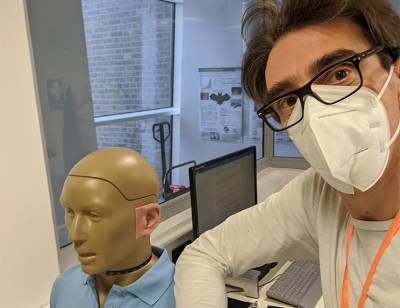
Activities & Projects
To assist research and teaching at the Ear Institute, I create bespoke hardware and software for a variety of applications, with a specialism in audio signal processing. Some recent software projects are listed below.
A software tool for the fast calibration of microphones and loudspeakers using a modern impulse response technique
The tool provides fast, accurate transducer frequency response measurement. In addition to the fundamental response, each of the harmonic responses is also made available. Due to the inherent rejection of acoustic reflections it is possible to perform the measurement within an echoic environment in many cases.
Online Coordinated Response Measure test
An online speech in noise test, derived from an in-lab implementation, enabling deployment to remote participants. The implementation performs real-time audio processing within the participants web browser, enabling the adaptive test procedure without resort to large stimuli sets. The test was developed to support a BRC funded PhD research project. In its latest incarnation the test also supports real-time spatialisation and is available for use on the Gorilla platform.
Spatial signal to noise ratio measurement
Combined with a head and torso simulator within the Ear Institute anechoic test chamber, this software performs automated signal to noise ratio measurements using a phase inversion technique. Developed in support of a BRC funded PhD research project, the complete system enables accurate quantitative performance measurements of hearing aid algorithms in a range of simulated real-world environments.
Remote Audiology Platform
A cross-platform smartphone application for remote audiological testing. The application includes a patient questionnaire and a pure tone audiometry test. Taking advantage of recent advances in low-cost digital headphone technology, the project aims to provide accurate hearing threshold measurement outside of the clinic. Data gathered by the application will be used as the basis for a student project, evaluating the efficacy of a remote testing approach, in the first instance.
Gordon's biography and education
It was a passion for music, but acknowledged lack of playing talent, which led me into audio electronics. Working in the professional audio industry as an R&D engineer during the digital audio revolution enabled me to satisfy my interests in music production, electronics, and software development. Finding the modelling of algorithms particularly interesting I was inspired to study mathematics, and I still find its application to engineering problems uniquely satisfying.
The rapid progress of technology during this period required me implement digital signal processing systems across a wide range of platforms. The journey equipped me with logic design skills which I then transferred to the semiconductor industry. Working as an integrated circuit design engineer gave me a deep understanding of microcomputer architecture. Following this, recognising my appetite for learning, I embarked on an engineering MSc programme here at UCL.
Finding the learning environment invigorating, I took up the post of Acoustics/Electronics Technician at the UCL Ear Institute following completion of my MSc. This role enables me to indulge my curiosity in the physics of sound, and our individual and collective responses to it. Working alongside scientists whose research aims to progress our understanding of hearing loss and develop practical interventions is an enjoyable and satisfying use of my engineering expertise.
I am still learning to play the guitar.
The Open University
First degree, Bachelor of Arts (Honours) | 2013
University College London
Other higher degree, Master of Science | 2019
Contact details
To view the resources Gordon has created, please email him directly at: gordon.mills.18@ucl.ac.uk
 Close
Close

